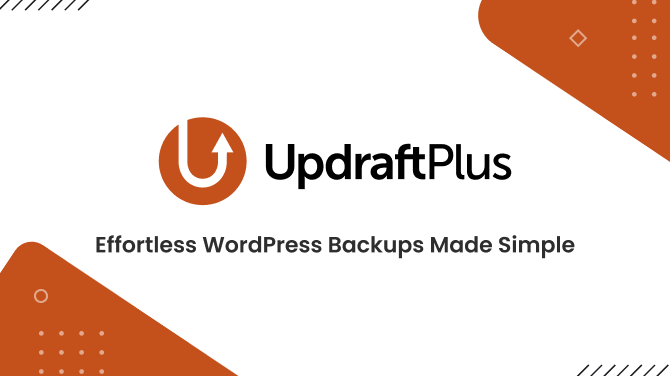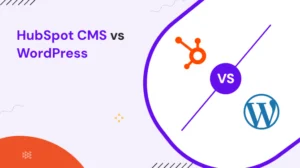Nowadays, data loss, hacking, plugin conflicts and server failure are quite common and day to day terms we all come across on the news in 2025. This is the main reason why people prefer to use WordPress backups. They are reliable, convenient and a perfect way to prevent any data loss or cyber attack.
Whether you own a simple blog website or a huge WooCommerce storefront, a trustworthy backup plugin can save you a lot of trouble.
With dozens of options available in the market, UpdraftPlus has proven its worth over time as the best WordPress backup plugins.
There’s no denying that with more than 3 million active installations, it is the most downloaded and popular WordPress plugin in the WordPress community. However, is it still the best option in 2025? Let’s figure it out
In this ultimate review, we’ll figure out what still makes it the best plugin for backup by going through the firsthand usage, forum discussions, professional reviews, and user feedback across WordPress.org, Trustpilot, Reddit, YouTube, and more.
Table of Contents
What Is UpdraftPlus?

UpdraftPlus is a WordPress backup and restore plugin. It allows users to back up their full WordPress websites, including its all files and database. You can backup your data either manually or by using a schedule. You can easily store backups in whatever remote locations you want and also restore them whenever you want with just a single click.
It is best suited for:
- Bloggers and solo creators who want easy backups without technical confusion.
- Agencies managing multiple client sites
- Developers requiring migration, cloning, and staging functionality
What Makes UpdraftPlus Unique?

Several factors differentiate UpdraftPlus from the rest of the field:
Modular Architecture: The core plugin is free and capable, while paid add-ons extend its capabilities.
Established Reputation: With over a decade of experience and development, UpdraftPlus has gained everyone’s trust. It has been used across millions of sites and has proven its worth.
Hybrid Model: Combined with open source and commercial extensions, it is accessible and robust. The free version isn’t messed up; it’s actually functional for many users.
UpdraftPlus Pricing and Plans
| Plan | Sites | Price (Annual) | Includes |
| Free | 1 | $0 | Backup/restore + 1 storage option |
| Personal | 2 | $70 | All features + support |
| Business | 10 | $95 | All features + multisite support |
| Agency | 35 | $145 | As above + priority support |
| Enterprise | Unlimited | $195 | Full features + WP-CLI, etc. |
| Gold | Unlimited | $399 | Backup managed centrally with UpdraftCentral |
Note: Pricing may change in the future, so check the latest pricing here. Individual add-ons can be purchased separately. Upgrades include one year of updates and support.
Hands-On Experience: Setting Up and Using UpdraftPlus
We’ve personally tested UpdraftPlus on a mid-sized WordPress website (~1.2 GB total size) hosted on a standard shared hosting environment (cPanel + PHP 8.2) to get a hands-on experience and understand it completely.
1. Installation Process:
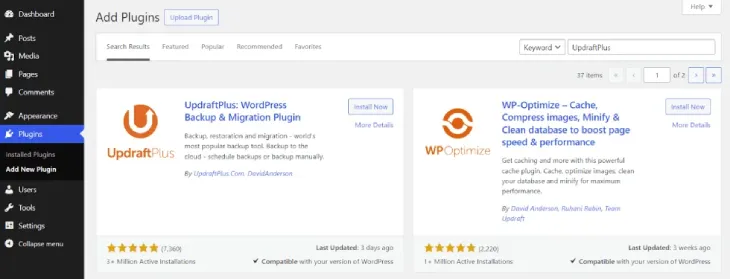
UpdraftPlus installs like any other plugin via the WordPress repository. Its Activation took a few seconds only, and no account creation was required to start backing up.
2. Initial Configuration:
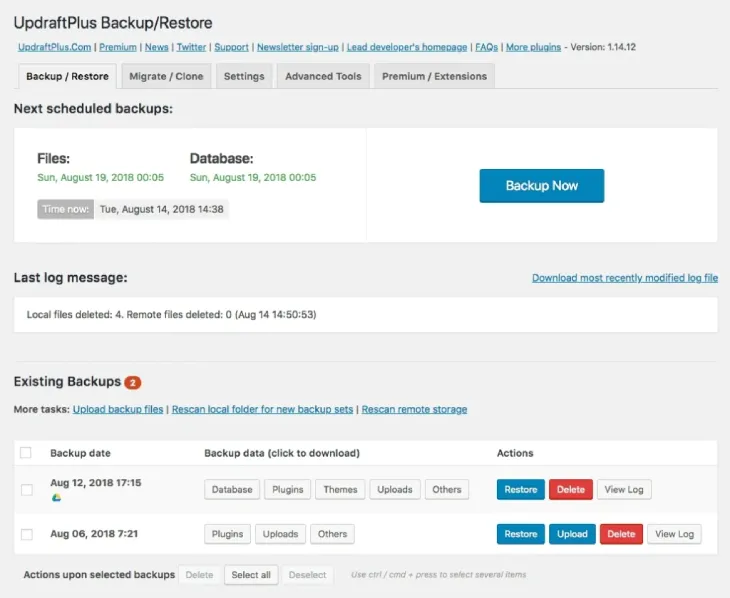
The default settings are fine for small sites, so we didn’t need to configure anything. However, here’s a brief walkthrough just in case you need to configure its settings. The Settings tab allows changes for:
- Backup frequency (files and database can be set separately)
- Retention count
- Remote storage options
3. Backup Scheduling and Remote Storage:
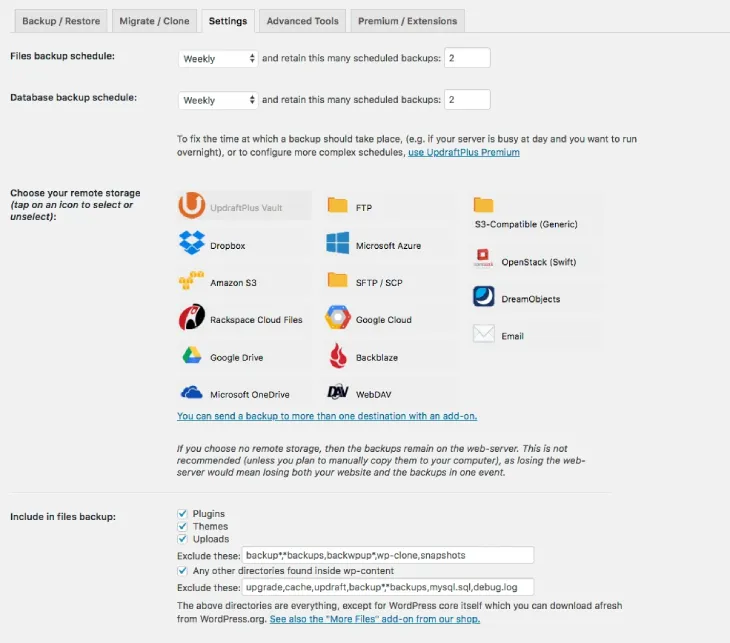
The backup scheduler worked perfectly as it should be. It has intervals ranging from every 2 hours to monthly, so set it as you like. It also supported multiple remote destinations like:
- Google Drive
- Dropbox
- Amazon S3
- OneDrive
- FTP/WebDAV
- Rackspace Cloud
- SFTP
Setting up Google Drive was easy and quick, yet it may be slightly technical. The OAuth authorization was required, yet overall, the documentation was clear, so we faced no issues.
4. Real-Time Performance:
Backup Speed: A full backup of our 1.2 GB test site (including media) took approximately 6-7 minutes on shared hosting. For Smaller sites, it finished in under 2 minutes only which is a pretty decent speed.
Resource Usage: CPU and memory usage remained perfectly fine under limits, so resource usage wasn’t much, which is a plus.
5. Restore Process:
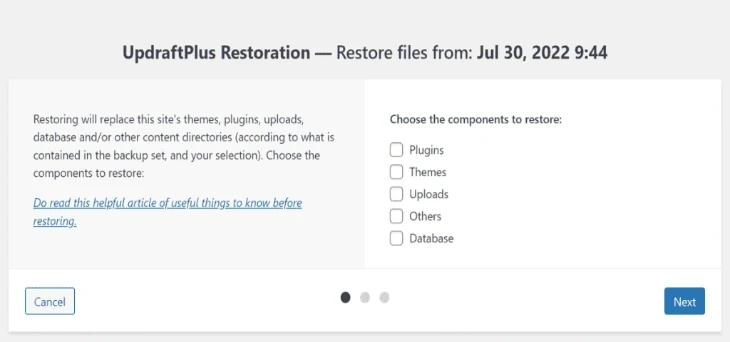
We tested both partial and full site restores with just a database for testing the process of its restoration. In both cases:
- The restore process was completed within 5–10 minutes.
- No downtime was experienced.
- Compatibility with theme and plugin settings remained perfect.
Its restore logs are detailed and explain everything properly. It also aids in debugging when needed.
Key Features Breakdown
1. Backup & Restore Settings:
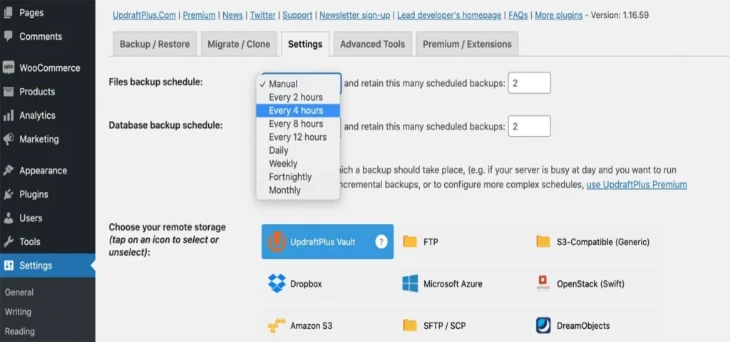
File and Database Separation: Now choose to backup either or both at once, as it is useful for rapid database backups and only backups during major edits.
Logging: Every backup generates a detailed log, such as stored in wp-content or Updraft. This helps a lot when diagnosing failed backups.
Scheduling: Fully customizable for both files and database. Moreover, Retention policies can prevent storage bloat as well.
2. Remote Storage Options:
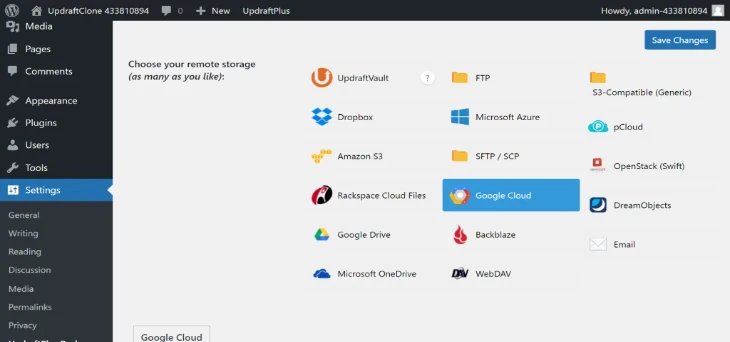
UpdraftPlus supports 15+ storage options which includes some of the most popular options as well:
- Dropbox
- Google Drive
- Amazon S3
- Wasabi
- WebDAV
- SFTP/FTP
- Backblaze B2
Now, at the same time, premium users can also back up to multiple storage options. This redundancy is quite unique or not in other competitors.
3. Premium Features:
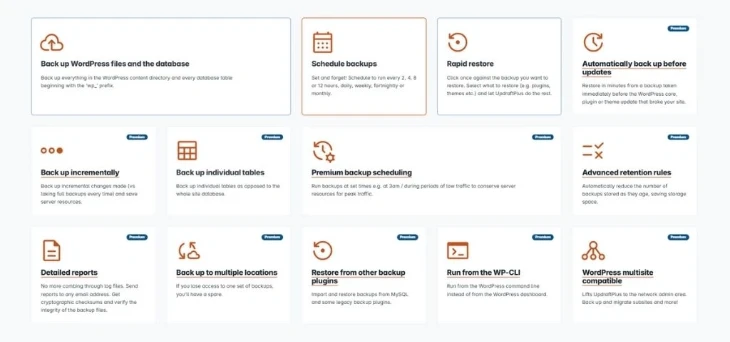
Incremental Backups: Backup your important files that have been recently updated or changed.
Cloning & Migration: Easy to clone and migrate your files anywhere you want.
Pre-update Backups: Automatically back up files before even WordPress, plugin, or theme updates.
Multisite Compatibility: Full network backups for restoring individual subsites.
Database Encryption: Ensures data security through database encryption.
4. Advanced Usability & Integration Insights:

Advanced Usability Highlights:
- Automate tasks using its WP-CLI commands which are especially useful in CI/CD pipelines.
- Users can leave or filter out specific plugin folders or theme assets to reduce storage load.
- Generates timestamped logs to simplify debugging of failed backups.
- Automatic email notifications with detailed backup results.
- Perfectly integrated with popular themes like Astra and OceanWP alongside popular plugins like WooCommerce, Yoast, Elementor and more.
Tool Integrations:
- Centralized backup management as it is compatible with ManageWP, MainWP, and InfiniteWP.
- Confirmed through multisite stress tests that it works efficiently with Elementor, WPML, and WooCommerce.
5. Support and Documentation:
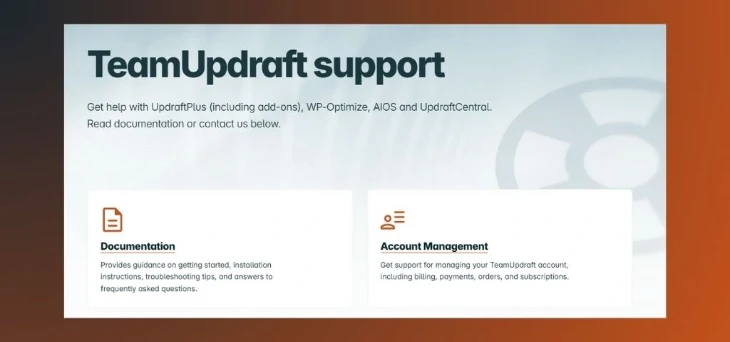
Documentation: Most users won’t need external help as it has a proper knowledge base in its documentation.
Free Support: Support is free as it is community-based, so the response time varies.
Premium Support: It also has a priority ticketing system for premium support. The response time on working days is under 24 hours in our test.
Pros and Cons Overview
| Pros | Cons |
| Backups are reliable, even on low-resource hosts. | UI is complex and not beginner-friendly, like its advanced settings |
| Offer excellent remote storage options like google drive, dropbox, s3, etc. | Important features like incremental backups are locked, and you gotta pay to upgrade your plan for them. |
| Have a solid restore process that is Intuitive and fast. | Longer waiting times for support and slow responses. |
| Flexible licensing that is suitable for two sites or 100, but not available for a single website. | |
| Documentation is proper and detailed. |
Security Features of UpdraftPlus
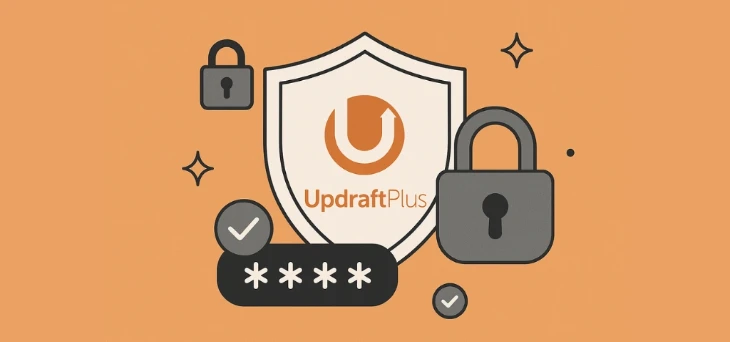
As we all know, backups provide a failsafe; however, they can also become a vulnerability if not properly protected. That’s why UpdraftPlus includes several security-focused features, ensuring that your backup data is safe from both in transit and at rest.
1. Database Encryption
UpdraftPlus premium supports the encryption of backup files, specifically from database dumps. Even if files are hacked or in the worst case destroyed, This feature makes sure all your data, plugin settings and even WooCommerce transactions will be secured.
- Encryption Standard: AES-256 encryption
- Control: Full control over which data to encrypt and which do not, like user tables, database, etc.
2. Secure Remote Storage Connections
Support all remote storage services like Amazon S3, Google Drive, Dropbox, etc, all use OAuth or API key-based authentication to ensure secure transmission, which is why having a secure remote storage connection is vital.
- Supports SSL/TLS for data transfers
- No credentials are stored in plaintext within the WordPress database
3. Access Control and Logging
- UpdraftPlus restricts plugin access to administrators only by default.
- Detailed backup logs are generated during every operation. It helps us with quick audits in the event of a failure or suspected intrusion.
4. Backup Locking
Allows administrators to lock the backup so that someone might not accidentally delete it from the dashboard. This adds an extra layer of safety for mission-critical archives.
5. Time-Based Retention
It provides Backup schedules that can be easily set up to automatically delete old backups after a certain period of time. It leads to reducing long-term storage vulnerabilities.
SEO Impact of Using UpdraftPlus
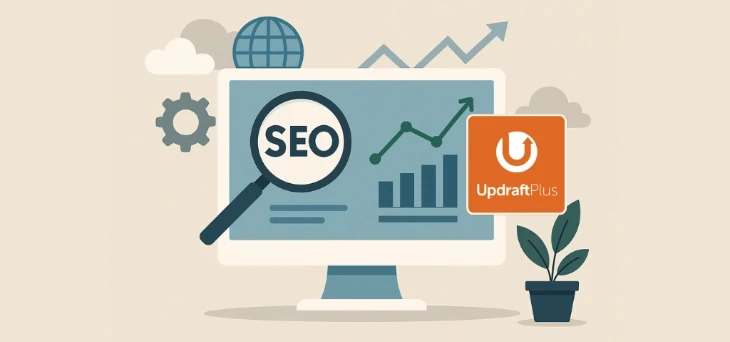
Most of the websites nowadays rely on search engine visibility to gain more traffic on their site. So, a plugin plays a vital role in supporting SEO efforts or atleast should not hinder it.
Here are the details on how UpdraftPlus’s backup operations and performance characteristics can influence your site’s search rankings:
1. Uptime Preservation Supports Rankings
Google values site availability as a vital ranking factor. In the cases of a site getting hacked, server crash, or misconfigured update, a swift restore is needed, and UpdraftPlus does it and reduces downtime.
Example: If any plugin update breaks the site, a restore must bring it back online just within a few minutes. This avoids a prolonged outage that might otherwise lead to ranking drops for your site.
Pre-Update Backups: In the Premium version, with the pre-update backup feature of UpdraftPlus, users can test changes easily without SEO risk.
2. Performance Management During Backups
Page load times are a known ranking factor and scheduled backups can be resource-intensive. So, if not properly configured, then it may affect site speed, especially on shared hosting.
Best Practices:
- Schedule backups during low-traffic hours.
- Use incremental backups to reduce server drain.
- Enable archive splitting (100MB–200MB) to avoid long processing cycles.
3. Avoid Indexing Errors from Broken Sites
Failed restores can result in broken pages or even misconfigured permalink structures. If a search engine encounters this, it may lead to 404 errors. This error can also lead to a huge problem for the site’s ranking.
Solution: UpdraftPlus ensures proper restores to keep safe permalink settings, .htaccess rules, and plugin configurations. These all are important for maintaining searchability as well.
4. Safe Plugin and Theme Testing (Without SEO Risk)
With cloning and migration add-ons, you can also test design or plugin updates on a staging environment before applying them live. This reduces the risk of accidentally introducing error-filled websites, which harm SEO a lot, such as broken schema markup, invalid tags, or content disappearance.
5. No SEO Footprint in Source Code
Some backup plugins inject visible messages or tracking scripts into the front-end or source code, which can lead to several issues or, like me, not like this kind of message in their source code. With Updraft, you don’t have to worry about anything. It takes care of all metadata, structured data and page weight.
How To Troubleshoot Common Backup Or Restore Issues in UpdraftPlus?

Even Though Updraft is the best and most trusted backup plugin, there’s always a possibility of facing technical errors or restore problems. Here we have mentioned some of the most common problems users face and how to solve them like a pro.
1. Backup Fails or Times Out
Cause: Server execution time or memory limits.
Solution:
- Navigate to Settings > Advanced Tools > Split Archive Every (MB) and reduce the archive split size.
- Increase your max_execution_time and memory_limit in your PHP settings if your host allows it.
- Disable other plugins temporarily to reduce background resource loading and use.
2. Backup to Remote Storage Fails
Cause: Invalid API credentials or expired tokens.
Solution:
- Re-authenticate with the storage providers such as Google Drive or Dropbox.
- Ensure the server allows outbound cURL requests which are commonly required for cloud connections.
- For S3, always confirm correct bucket permissions and region settings to avoid misconceptions.
3. Restore Stuck or Partially Completed
Cause: Incomplete archive files or server timeout.
Solution:
- First, confirm all backup archive parts are present in the backup directory.
- Instead of cloud restore, use the Restore from backup directory option.
- Temporarily disable security plugins that may be interfering with file operations.
4. Restore Does Not Reapply Themes or Plugin Settings
Cause: Configuration files may be left or improperly restored.
Solution:
- Ensure the “Plugins,” “Themes,” and “Other” components were included in the backup.
- Check restore logs for file permission errors.
5. Restore Button Greyed Out
Cause: JavaScript conflict or missing file references.
Solution:
- Clear your browser cache and retry doing it again on a private or incognito window.
- Re-scan local backup files from the “Existing Backups” tab.
Quick Tip: UpdraftPlus provides detailed logs of every operation. When in doubt, open the log and take a look for entries marked as ERROR or WARNING. These mostly pinpoint the exact line of failure.
User Feedback Across Platforms
1. WordPress.org Plugin Reviews:
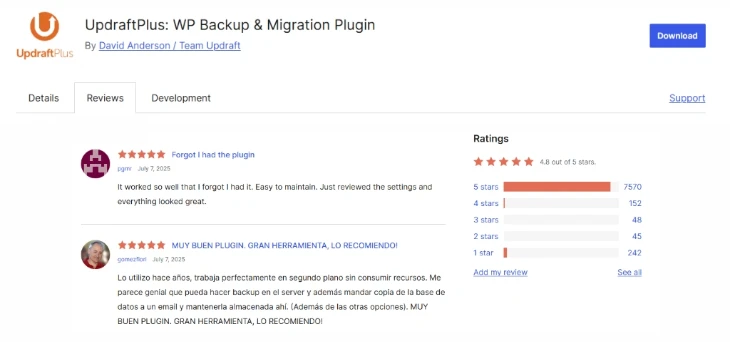
UpdraftPlus has more than 3 million active installations with an average rating of 4.8/5, which is already top-notch for a WordPress backup plugin. It proves its important features like:
- Reliability
- Google Drive integration
- Easy restores
However, it has some minus points as well, which are often mentioned:
- Some useful features are locked behind paywalls
- Advanced settings are difficult to understand
2. Trustpilot Ratings and Complaints:
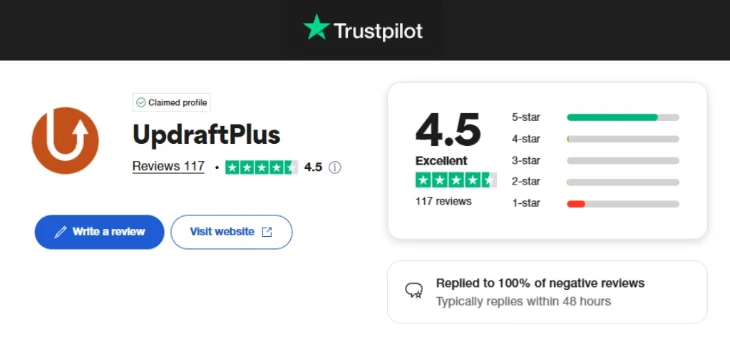
With around a 4.5/5 rating and over 100 reviews, it has a Trustpilot rating, so these are its good as well as bad remarks:
Positive remarks:
- Fast premium support
- Works flawlessly most of the time.
- Clear documentation
Negative remarks:
- Slow response from support
- Difficulties after canceling subscriptions
3. Reddit and Community Forums:
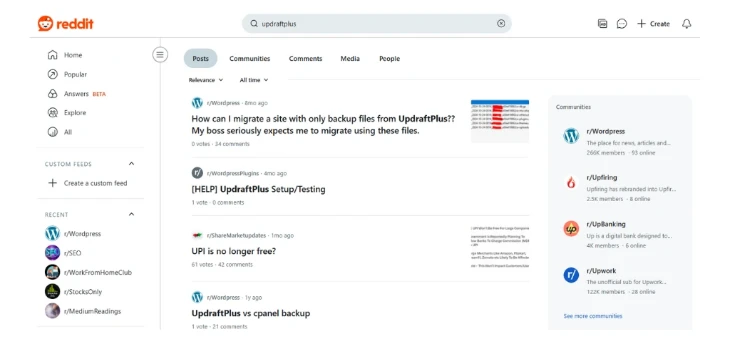
In WordPress and WPBeginner forums, UpdraftPlus is mostly recommended for beginners. However, Reddit users and posts often highlight these features, which are a little troublesome for them:
- Stability
- Preference over Jetpack or VaultPress due to independence from Automattic
- Complaints about the clunky UI
4. YouTube Review Highlights:

Some technical YouTubers also point out these important points that it’s:
- Ease of use for solo bloggers
- Excellent remote storage options
- Cloning add-on performance for migrations
5. Capterra & G2 Feedback:
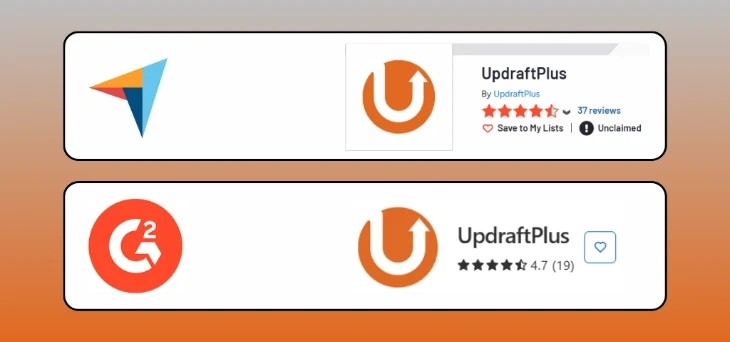
On Capterra, UpdraftPlus has a rating of 4.7/5 from small businesses and solopreneurs. G2 has a 3.8/5 rating, highlighting similar reviews, comments, and feedback, with minor negative complaints:
- Premium pricing structure
- UI complexity for new users
- Poor customer support
UpdraftPlus Alternatives (Comparison Table)
| Plugin | Free Version | Remote Storage | Incremental | Restore UI | Migration |
| UpdraftPlus | ✅ | Yes | Paid | Yes | Paid |
| BlogVault | ❌ | Yes | Yes | Yes | Yes |
| Jetpack VaultPress | ❌ | Cloud only | Yes | Yes | No |
| Solid Backups | ❌ | Yes | Yes | Yes | Yes |
| BackWPup | ✅ | Yes | No | Basic | No |
| AIO WP Migration | ✅ | No | No | N/A | Yes |
| WP Staging | ✅ | No | N/A | No | Yes |
| Duplicator | ✅ | Paid | No | Basic | Yes |
| Backup Migration | ✅ | No | No | Basic | No |
1. UpdraftPlus vs BlogVault:
Summary: BlogVault is known for having a user-friendly interface along with real time automation. Although it is a good option for beginners, we cannot ignore the fact that it sure is expensive. Meanwhile, UpdraftPlus is easier to use, more flexible and affordable for developers and agencies.
| Feature | UpdraftPlus | BlogVault |
| Backup Type | Scheduled, manual, incremental* | Real-time, incremental |
| Remote Storage | 15+ services (Drive, S3, etc.) | BlogVault’s private servers only |
| Multisite Support | Yes (premium) | Yes (higher-tier plans) |
| Migration Tools | Add-on based | Included |
| Free Version Available | Yes | No |
| External Dashboard | Yes, but you need to install the UpdraftCentral plugin | Yes |
2. UpdraftPlus vs Jetpack VaultPress Backup:
Summary: Jetpack VaultPress backup is popular for its simplicity and automation. While UpdraftPlus provides deeper control and is better suited to technical users or multi-site administrators.
| Feature | UpdraftPlus | Jetpack VaultPress |
| Backup Type | Scheduled (real-time via add-on) | Real-time automatic backups |
| Storage Options | Multiple third-party providers | Jetpack’s secure servers |
| WooCommerce Compatibility | Yes | Yes |
| Migration Tools | Add-on | Yes |
| Dashboard UX | WordPress-native | Jetpack cloud-based |
| Free Tier | Yes | No |
Is UpdraftPlus the Right Backup Plugin for You?
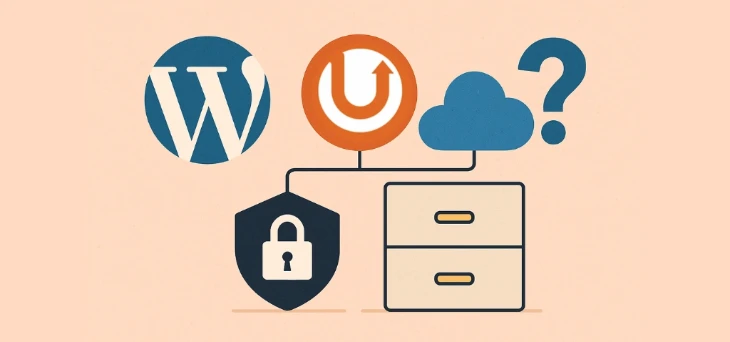
Plans Recommendations:
- Solo bloggers: The Free version offers everything you need.
- Small businesses: The Premium version ensures a trouble-free experience.
- Agencies: A business or Agency plan gives full flexibility.
- WooCommerce stores: The Premium plan gives the power of incremental backups and fast restores.
When Not to Use:
- If you need a beginner-friendly UI with zero setup, BlogVault is a good option.
- If you want automatic real-time backups on a cloud interface, Jetpack, VaultPress, or BlogVault would be better.
Possible Future Updates for UpdraftPlus

Based on user feedback forums, the following changes and improvements can be done:
1. Revamped User Interface: We can see major UI and UX updates to simplify navigation and onboarding for non-technical users, which is not a major drawback.
2. Native Real-Time Backups: While currently dependent on scheduled jobs, a new built-in real-time engine without third-party syncing might be available in the coming years.
3. Staging Environments: Future updates like feature one-click staging support from the plugin interface directly can make a major difference.
4. Multi-User Dashboard Access: Team-based access controls, especially for the Agency and Enterprise plans, are expected to allow role-based restrictions as well.
5. Better WooCommerce Hooks: Some better WooCommerce backup hooks will improve the integrity of transactional data during high-traffic sales periods.
If implemented for real, UpdraftPlus will easily be able to compete directly with the SaaS-based WordPress Backup platforms while also having the advantage of plugin control. But for now, let’s see how it turns out in the future.
Conclusion
UpdraftPlus remains one of the most flexible WordPress backup plugins in 2025. Its trust relies on its flexibility, reliable restores, and broad remote storage options. Even with some features being locked behind a paywall, the free version is sufficient for most personal uses and small business use cases.
For agencies or users with uptime requirements, getting a premium version can open many new features. But if you want more advanced automatic features and a better beginner and user friendly interface, you can go for BlogVault or Jetpack VaultPress.
Final Verdict: If you want a trustworthy, reliable and flexible WordPress backup plugin, UpdraftPlus got everything you can ask for.
Frequently Asked Questions (FAQs)
What is UpdraftPlus used for?
UpdraftPlus is a popular and most trusted WordPress plugin. It is used for backing up your website’s data and files in a few seconds. It helps you prevent any kind of data loss in future and saves the trouble of saving data anywhere randomly. You can restore your backed up data anytime you want.
How important is the Updraft Backup plugin?
As we all know, backing up your data is very important in the days of regular cyber attacks and server failures. Updraft does it for you. It backs up your website’s data so you can restore it anytime you want.
Is UpdraftPlus safe?
With more than 3 million active installations, Updraft has gained users’ trust and become the most popular and safe plugin to use. It is also updated and maintained on a regular basis to ensure its security.
Is UpdraftPlus free or paid?
It has both. For users looking for a free version without having to pay a huge price, it has basic backup and restore features. For users who want more advanced features like cloning, incremental backups and so much more, it also has a premium paid version.
Is UpdraftPlus Premium worth it?
If you manage multiple sites or need advanced features like migration, cloning, scheduling, and countless options for remote storage, then yes, getting UpdraftPlus is worth the money.
Where does UpdraftPlus store backup files?
UpdraftPlus stores your data wherever you like. It has a dozen of popular storage options like Google Drive, Dropbox, Amazon S3, OneDrive, your own server and so much more. However, remember that the free version has less options for storage compared to the premium.
Can it handle WooCommerce backups?
Of course, it can. Full file and database backups ensure WooCommerce support for orders as well.
What happens if a backup fails?
Don’t worry about backup failures with UpdraftPlus. It logs every error so you can retry or consult the documentation.
Why is my UpdraftPlus backup not finished?
It could be due to server timeouts, limited hosting resources, or file size. Try reducing the size of each backup batch in the settings or using remote storage.
Does it offer real-time backups?
Yes, but not in the free version. The premium version offers incremental backups and so many more advanced features, but not true real-time syncing.
Can UpdraftPlus clone or backup a site for transfer to a new cPanel via DNS nameserver change?
Yes. UpdraftPlus includes a cloning/migration tool. You can easily back up your website’s data and files, move to a new account using its migration tool, and update your DNS to point to the new server.
